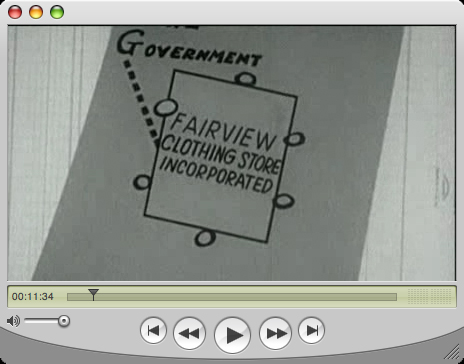The Corporation
Sorry for the momentary break in our 100% puppy program, but the other night we watched The Corporation, and I felt it might be worth recommending to interested individuals. I'm sure the title makes it fairly clear that the message was rather anti-corporate. There was a fair amount of spin, naturally. For instance, in the coverage of the Bolivian Water Wars over the privatization of Bolivia's water utility, the assertion that it was illegal to collect rain water was presented without any qualification. Granted, this information was part of an interview with one of the protest leaders, and should be taken in context. Unfortunately it served to obscure a truth that was no less outrageous. While it was in all likelihood not illegal to collect rainwater, Bechtel did have the right to appropriate smaller, community water projects that had been paid for with community or private funds, to install water meters on those projects, and charge residents for the installation of the meters. I guess when you expect to extract a 15-17% profit from a 3rd world water utility, you'll do whatever it takes.
 One of the key benefits of incorporation is the fact that the corporation is treated as a legal person. In the film this legal fiction is employed as a literary conceit, building the case that if a corporation is a person, that person is psychotic. It occurred to me that this concept of legal personhood, and the way in which that personhood is manifest, is rather like the occult concept of an egregore, or "thought form" (as it turns out, whoever wrote the Wikipedia article had the same idea). This reminded me of a podcast I heard about a guy who, operating under the assumption that an egregore is an independent entity and can therefore be acted upon in the same way as an individual, cast a love spell on Fox News (so if Fox News isn't giving you the same "fair and balanced" conservative propaganda that you've come to expect, blame it on Jason Louv). There seems to be something to this, and the term egregore may just be a wacky name for a very real phenomenon. Several of the interviews in The Corporation are conducted with CEOs and board members of large corporations that have committed immoral acts under their watch. The one commonality linking all of the interviewees is their sincerity, their belief that they are moral men, concerned for human rights, the environment, and justice. Think for a moment of Bill Gates (not featured in the film). Based on his charity work I think it would be fair to assume that he is a moral and concerned individual, dedicated to improving human life on a very fundamental level. Yet the company he founded is a petulant monster. Are we to assume then that Bill Gates is not in fact a moral individual, but is himself a petulant monster in disguise? Not necessarily. The incorporation of Microsoft (and any other corporation for that mater) is the legal and metaphorical "embodiment" of an entity whose primary purpose is to make money. That is not its sole purpose, but those secondary purposes serve to differentiate it from its competitors (i.e. it is a software company, not a hardware company; it engages in legal commerce, rather than robbing banks or trafficking drugs), and are therefore ancillary. The act of incorporation is the delegation of responsibility and liability to a collective entity with little or no motivation to act responsibly or morally. The corporation desires to make money, and it will do so through any means possible, as long those means do not compromise its ability to continue to make money, provided it doesn't get caught. Turning such a behemoth around requires a concerted act of will (contemporary magic is often thought of in those terms), essentially, the addition of new input into the component elements of the egrigore, or the inoculation of radical new values into a corporate culture.
One of the key benefits of incorporation is the fact that the corporation is treated as a legal person. In the film this legal fiction is employed as a literary conceit, building the case that if a corporation is a person, that person is psychotic. It occurred to me that this concept of legal personhood, and the way in which that personhood is manifest, is rather like the occult concept of an egregore, or "thought form" (as it turns out, whoever wrote the Wikipedia article had the same idea). This reminded me of a podcast I heard about a guy who, operating under the assumption that an egregore is an independent entity and can therefore be acted upon in the same way as an individual, cast a love spell on Fox News (so if Fox News isn't giving you the same "fair and balanced" conservative propaganda that you've come to expect, blame it on Jason Louv). There seems to be something to this, and the term egregore may just be a wacky name for a very real phenomenon. Several of the interviews in The Corporation are conducted with CEOs and board members of large corporations that have committed immoral acts under their watch. The one commonality linking all of the interviewees is their sincerity, their belief that they are moral men, concerned for human rights, the environment, and justice. Think for a moment of Bill Gates (not featured in the film). Based on his charity work I think it would be fair to assume that he is a moral and concerned individual, dedicated to improving human life on a very fundamental level. Yet the company he founded is a petulant monster. Are we to assume then that Bill Gates is not in fact a moral individual, but is himself a petulant monster in disguise? Not necessarily. The incorporation of Microsoft (and any other corporation for that mater) is the legal and metaphorical "embodiment" of an entity whose primary purpose is to make money. That is not its sole purpose, but those secondary purposes serve to differentiate it from its competitors (i.e. it is a software company, not a hardware company; it engages in legal commerce, rather than robbing banks or trafficking drugs), and are therefore ancillary. The act of incorporation is the delegation of responsibility and liability to a collective entity with little or no motivation to act responsibly or morally. The corporation desires to make money, and it will do so through any means possible, as long those means do not compromise its ability to continue to make money, provided it doesn't get caught. Turning such a behemoth around requires a concerted act of will (contemporary magic is often thought of in those terms), essentially, the addition of new input into the component elements of the egrigore, or the inoculation of radical new values into a corporate culture.JR let us borrow the movie, and has had some thoughts of his own regarding corporations. He thinks they should all be reincorporated as not-for-profits, though not necessarily with 501(c) status. I think that shareholder status should be extended to more stakeholders (starting with employees), and that aspects of direct democracy be put into practice at critical points in the day-to-day operations of a company. I can only imagine what it would have been like back at old VMSC if the entire company voted on whether or not to take on a particularly obnoxious client. It would have put an end to the constant blame game, since all of us would have been responsible for taking the son of a bachelor on.



I must comment on my profound disappointment at the interruption of “puppy” coverage. I have a very hard time understanding that there maybe more “important” or “interesting” subject to cover.
ReplyDeleteCorporate misdeeds effect the lives of puppies everywhere. You remind me of those people who would spend a dollar a day to feed starving third world puppies without ever considering how they got there, and what real change is necessary to improve their lives. You sicken me, anonymous (if that is your real name).
ReplyDelete